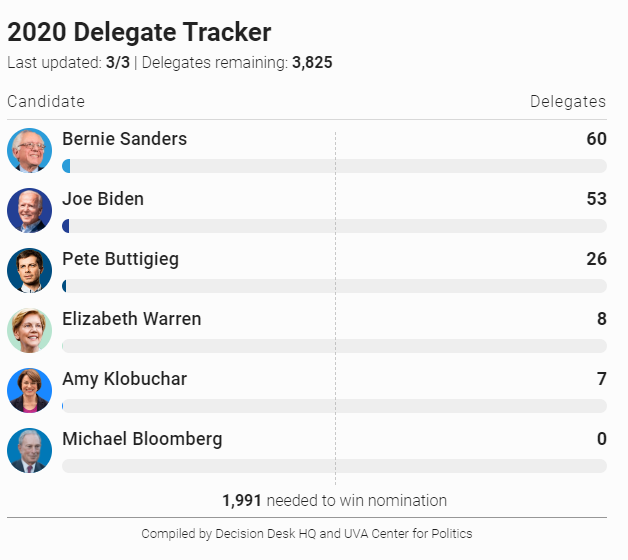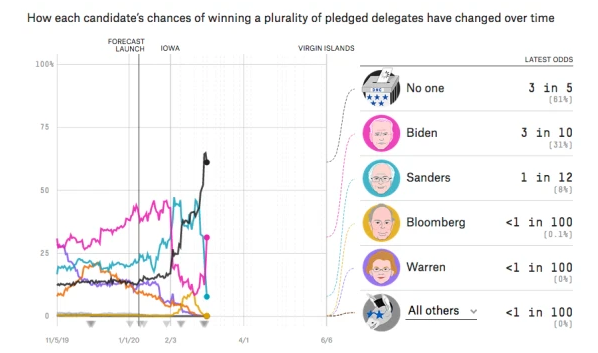
A third of all pledged delegates in the Democratic presidential race will be doled out on Tuesday across 14 states — from California to Maine — in the single biggest day of the 2020 contest.So, what’s going to happen?
California and Texas are the two biggest states voting today, and obviously, much focus is on them. Here in North Carolina, I already voted — for likely non-nominee Elizabeth Warren. In both California and Texas, which have the most delegates up for grabs and, therefore, matter most today, Warren is running a solid third behind Sen. Bernie Sanders and Joe Biden. And, more importantly, she is above the 15% threshold to win delegates in each. If Warren can stay above that 15% number in both of those states, Tuesday will be a very good day for her campaign, no matter what else happens.
Sanders is expected to do well in the west and northeast. FiveThirtyEight lists him as a significant favorite in California, Utah, Colorado, Massachusetts, Maine and his home state of Vermont. He’s also favored in Minnesota.
Biden is expected to do better in the south, a less liberal region and one with a larger share of African-American voters. A good night for Biden would see him winning Alabama, Arkansas, North Carolina, Oklahoma, Tennessee and Virginia. On a very good night, he would also win Texas, where the polling suggests a close race. “The Amy/Pete coalition for Biden is big. But, in order to succeed on Super Tuesday, he still needs Bloomberg to collapse,” Amy Walter of The Cook Political Report writes.
Former Vice President Joe Biden has gotten a lot of good news over the past few days. A huge, almost 30-point win in South Carolina. A series of impressive endorsements. Other candidates in the moderate lane — namely, former South Bend, Indiana, Mayor Pete Buttigieg and Sen. Amy Klobuchar, who were among those endorsers — dropping out.
But one thing we haven’t had a lot of since South Carolina was hard data. That changed late last night with a flurry of new polls — we now have at least two polls conducted since South Carolina in every single Super Tuesday state. So the picture heading into Super Tuesday is a lot clearer, and overall, things look good for Biden.
Biden is now about twice as likely as Sanders to win a delegate plurality, according to our primary model, which gives him a 65 percent chance of doing so compared with a 34 percent chance for Sanders. This represents the culmination of a trend that has been underway in the model for about a week; it started to shift toward Biden once polls showed the potential for him to win big in South Carolina — and it anticipated a polling bounce in the Super Tuesday states if he did win big there. Still, even after South Carolina, Biden’s plurality chances had risen only to 32 percent, compared with 64 percent for Sanders. That means the polling bounce from the events of the past few days has been bigger than the model anticipated.

The real fight at the moment is not to beat Sanders in delegates collected on Super Tuesday — even the most pessimistic projections for the Vermont senator assume he wins the most — but rather to be the person who takes the second most delegates, and, by extension, can make the case as the Bernie alternative.That fight is between Biden, Warren (due to her strength in California, largely) and Bloomberg, and the former vice president would appear to have a leg up at the moment as he comes into Tuesday with momentum from his larger-than-expected win in South Carolina over the weekend and a slew of endorsements — including from Klobuchar and Buttigieg — announced on Monday.For Biden to slot in behind only Sanders in delegates, he need a few things to happen: a) get over 15% in California b) win or come close in Texas and c) run up the margins in southern states — Virginia, Tennessee, Alabama — where the Democratic electorate will have a major African American tilt.
Sanders should do quite well in New England (Maine, Massachusetts, Vermont) as well as in Minnesota and Colorado. But it’s California where Sanders’ day will be made (or not). There’s virtually no question that Sanders will win the state but the key is whether or not Biden, Warren or Bloomberg can get to 15% or more.If no one other than Sanders gets to 15% statewide, he will get almost 60% of all of the delegates, according to calculations made by the Cook Political Report’s David Wasserman. If, on the other hand, two non-Sanders candidates got 15.1% of the vote each, Sanders would win just 38% of California’s delegates. So, BIG difference.
Then there is the Bloomberg question. The last 72 hours have been former New York City Mayor Michael Bloomberg’s worst-case scenario: Biden crushes in South Carolina’s primary and a rapid lining-up of centrist former candidates behind him occurs. The entire premise of Bloomberg’s candidacy is that Biden is too weak to win the nomination. And now, on the day Bloomberg’s campaign has focused all its efforts (and money) since he began running for president, he finds Biden with all the momentum.Given the amount of money Bloomberg has spent on ads, staff and, well, everything else on Super Tuesday states (well more than $500 million), it has to be considered a major disappointment if he doesn’t make the 15% threshold for delegates in California and Texas. Polling in both states suggests Bloomberg is slightly below the cut-off line in each state; if he doesn’t make viability statewide in either one, it’s very, very likely that Bloomberg has a bad night — regardless of what happens elsewhere in the country.
